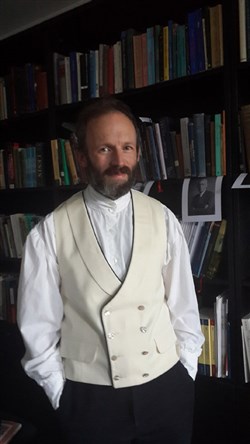John James Alexander, Assistant Professor, Department of Political Science
BY MELİS ERDEM (ARCH/II)
I had to think about it for a while, but I would say the book that influenced me most was probably Hegel’s “Philosophy of Right,” because it opened up philosophy for me.
This is the only time I can clearly remember the effect reading a book had on me. Here is how it happened: I was at home, and the house was empty. And I thought, “Now I’ll try to read Hegel; I’ve never read the ‘Philosophy of Right,’ but one of my teachers said it was a very difficult book.” And I sat down—I was alone in the house—and for some reason I had a huge cigar with me, so I lit up and started to read.
And I read for an hour, an hour and half maybe, and then I heard a key in the door. I was living with my friends at the time. One of them came in; he was studying philosophy—in fact, he was studying Schopenhauer, and Schopenhauer hated Hegel. I heard him coming and I stood up and went out of the living room to go into the kitchen, and I almost fell over. I felt really dizzy. I told him about reading Hegel. I couldn’t tell whether it was Hegel or the cigar that had made me dizzy. But the book had a very strong effect on me the first time I read it. I’ve never had that feeling about any other books or philosophers.
There is something very distinctive about Hegel, actually. Hegel is a systematic philosopher and a lot of people, both non-philosophers and philosophers, hate system—they don’t think there should be an attempt to impose a system on all of reality. And that’s what you get when you read Hegel. What I found particularly attractive was his systematic method of thought. His premise is that if you have something you want to think about, you can put it in a place in a system, which will mean that you can connect it to other things within the system—not necessarily through linear arguments, but through contradictions. So, the point of Hegel’s thinking is that you can have a system that incorporates contradictions, and that was what excited me.
 I’m not sure I saw it clearly when I was 30, but as the years have gone on, I’ve found it more and more interesting to have a point of view that is systematic but also pays attention to contradictions rather than trying to ignore them.
I’m not sure I saw it clearly when I was 30, but as the years have gone on, I’ve found it more and more interesting to have a point of view that is systematic but also pays attention to contradictions rather than trying to ignore them.
My own way of thinking is thus very systematic but also interested in contradictions. Most of the work I do is about politics. For example, I wrote a paper about conservatism this year. What I do in such a case is ask what conservatism is and try to come up with a systematic answer that includes a contradictory view about what conservatism is. So I don’t argue for one position on conservatism; I try to take different positions that contradict each other and show how they still make sense despite this.
I think Hegel as a philosopher indicated something was possible that other philosophers didn’t. Most academic philosophers now and most famous philosophers in history have argued in lines. They begin with some assumptions and then try to argue in a line to a conclusion—steps in an argument. So you have an argument, you take a step, and you go in one direction. And that, to me, is not interesting. It’s a mistake, I think; it’s boring. That’s why I’m in the political science department—politics is more interesting than philosophy. Hegel shows that you can be dizzy, drunk. Because you have a sense of contradiction, you can think in a chaotic way, but it still makes sense because you’re trying to make something systematic out of the chaos.

